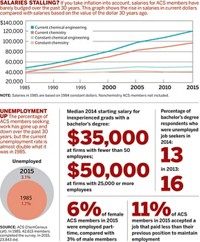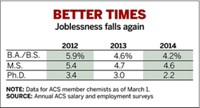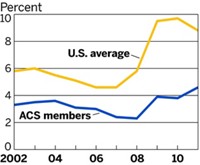Advertisement
Grab your lab coat. Let's get started
Welcome!
Welcome!
Create an account below to get 6 C&EN articles per month, receive newsletters and more - all free.
It seems this is your first time logging in online. Please enter the following information to continue.
As an ACS member you automatically get access to this site. All we need is few more details to create your reading experience.
Not you? Sign in with a different account.
Not you? Sign in with a different account.
ERROR 1
ERROR 1
ERROR 2
ERROR 2
ERROR 2
ERROR 2
ERROR 2
Password and Confirm password must match.
If you have an ACS member number, please enter it here so we can link this account to your membership. (optional)
ERROR 2
ACS values your privacy. By submitting your information, you are gaining access to C&EN and subscribing to our weekly newsletter. We use the information you provide to make your reading experience better, and we will never sell your data to third party members.
Careers
2003 Starting Salary Survey
Full-time work was harder to find for 2002-03 chemistry graduates
by MICHAEL HEYLIN, C&EN WASHINGTON
April 19, 2004
| A version of this story appeared in
Volume 82, Issue 16
Chemists who graduated during the 2002–03 academic year can be congratulated for their accomplishment, but not for their timing. Last fall, they entered a job market that was still softened by a persistent inability of the economy--which has been growing in gross domestic product terms since late 2001--to consistently generate jobs in significant numbers.
This decoupling of economic growth from jobs growth was reflected in fewer full-time permanent jobs for chemistry graduates. It was also related to a spotty starting salary performance compared with the previous two graduating classes.
According to the latest annual American Chemical Society survey of the starting salaries and employment status of chemistry graduates, the median salary of inexperienced 2002–03 Ph.D. graduates was $63,300. This was down from $67,500 for the previous class and from the all-time high of $69,500 for the 2000–01 class.
The survey also indicates that for inexperienced master's chemistry graduates, there was a 2001–02 to 2002–03 salary dip from $45,000 to $44,500. For bachelor's graduates, the 2002–03 median of $32,000 was up by $1,000 from the previous year. But it remained below the all-time high of $33,500 for the 2000 class.
Inexperienced graduates are defined as those with less than 12 months of technical work experience prior to graduation.
As to employment, 37% of 2002–03 chemistry Ph.D. graduates found full-time permanent jobs. This was down from 45% for the three previous classes. And over this same period from 1999–2000 to 2002–03, the corresponding declines have been from 35% to 24% for bachelor's graduates and from 56% to 41% for master's graduates.
DOWNLOAD STARTING SALARY SURVEY
( Adobe PDF format)






Join the conversation
Contact the reporter
Submit a Letter to the Editor for publication
Engage with us on Twitter